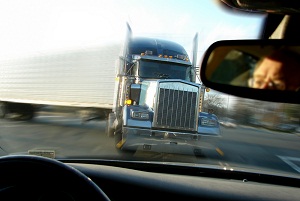Bob Franklin, a well respected Maryland lawyer who defends trucking companies for Franklin & Prokopik, wrote an article on defendant truck accident cases advising defense lawyers on handling plaintiffs’ truck accident lawyers’ vicarious liability arguments entitled. “But I Didn’t Do It!” Expanding Theories of Vicarious Liability, 58 Fed’n Def. & Corp. Couns. Q.347 (2008). You can’t deny it is a catchy title.
It is a well-written article advising defense lawyers how to combat different theories of vicarious liability conjured up by plaintiffs’ truck accident lawyers. But, obviously, it is also a suitable read for lawyers bringing truck accident cases looking for coverage in the event of serious injuries.
Franklin offers one piece of advice I found interesting:
With rising insurance costs and tight operating ratios for motor carriers and private fleet operators, many have limited excess insurance coverage or none at all. That trend coupled with ever increasing jury verdicts and settlements means there is frequently not enough insurance available to satisfy a potential or actual judgment.Such a scenario may put the fleet operator’s assets at risk if and when there is an excess judgment. Many fleet operators, particularly smaller ones, would do well to take advantage of recent changes in the law, particularly the Graves Amendment, which effectively precludes liability from being imputed simply by virtue of ownership of a vehicle that was involved in an accident. Having a separate corporate entity own the trucks (usually the operator’s most valuable asset) and lease them to the operators may effectively shield the vehicles from potential excess exposure if the proper procedure is followed.
Set up another company to avoid liability. They are telling us how they will get over on us and they are doing it in open view. It is like a shoplifter who looks at the security camera and smiles. Or like this.
But Maryland courts may be unencumbered by this kind of fictional corporate entity and deal with the substance of this scheme and to pierce the corporate veil if there is fraud or proof that it is necessary to enforce a paramount equity. The Maryland rule on paramount equities is that when substantial ownership of all the stock of a company is in a single person or company and there are facts supporting disregard of the corporate fiction on grounds of fundamental equity and fairness, Maryland will apply the “alter ego” or “instrumentality” theory to pierce the corporate veil, creating liability on the individual shareholder.
Would Maryland pierce the corporate veil in a case where a trucking company did exactly what Franklin recommends? To determine paramount equity, Maryland considers whether the corporation was grossly under-capitalized, the dominant stockholder’s siphoning of corporate funds, the absence of corporate records, and the company’s status as a facade for the stockholders’ operations. Most likely, these factors would be at play if a trucking company does just what Franklin recommends. Big picture-wise, is this really something we want to encourage as a society? Doesn’t “paramount equity” require courts to ignore this sham? Otherwise, “paramount equity” is an oxymoron.
Truck accident lawyers representing victims should keep in mind these efforts of truck accident defendants to shed liability for injuries caused by their negligence by aggressively looking at all the corporate entities involved.
 Maryland Injury Law Center
Maryland Injury Law Center


